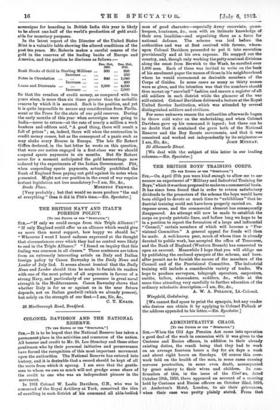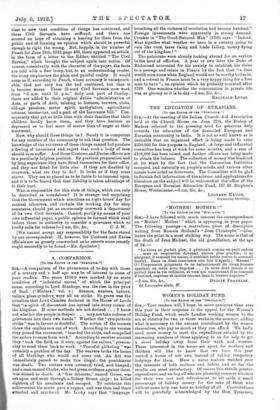ADMINISTRATIVE CHAOS.
[To THE EDITOR OF THE " SPECTATOR:1 SIR,—When. the Old Age Pension Act came into operation a good deal of the work in connexion with it was given to the Customs and Excise officers, in addition to their already existing duties, the result being that they had to work on an average fourteen hours a day for six days a week and about eight hours on Sundays. Of course this over- work told on the health of the men, in some cases causing nervous prostration, in some even death, accompanied by great misery to their wives and children. In con- firmation of this, in the issue of the Civil 'an, dated October 29th, 1910, there appeared an account of a meeting held by Customs and Excise officers on October 22nd, 1910, at Anderton's Hotel, London, to air their grievances, when their case was pretty plainly stated. From that time .to now that condition of things has continued, and these Civil Servants have suffered, and there has seemed no hope of obtaining a hearing for them from the public and of forming an opinion which should be powerful enough to right the wrong. But, happily, in the number of Punch for June 19th, 1912, page 468, there appeared an article, in the form of a letter to the Editor, entitled "The Civil Service," which brought the "subject again into notice. Of course, consistently with the character of the paper, the facts are told with a fine irony, hut, to an understanding reader, the irony emphasizes the plain and painful reality. It would seem as if, according to Punch, whose accuracy is unimpeach- able, that not only has the bad continued, but that it is become worse. These ill-used Civil Servants now work from " 6 a.m. until 11 p.m." daily and part of Sunday; there are added to their original duties "administration of Acts, or parts of Acts, relating to licences, brewers, clubs, old-age pensions, motor spirit, methylators, agricultural returns, income-tax, and a part of the Insurance Bill." Con- sequently they get so little time with their families that their children hardly know them, and they have become so depressed as to feel more of sorrow than of anger at their treatment.
Now, why should these things be P Surely it is competent for any member of the community to ask that question. The knowledge of the existence of these things cannot but produce a feeling of uneasiness and regret that such a body of men should thus suffer. And these Customs and Excise officers are in a peculiarly helpless position. By previous preparation and by long experience they have fitted themselves for their office, and they are fitted for little else. If they are disabled by overwork, -what are they to do ? It looks as if they must starve. They are so placed as to be liable to be imposed upon, and it is to be feared that that liability is taken advantage of to their hurt.
Who is responsible for this state of things, which can only be described as scandalous It is strange and surprising that the Government which sanctions an eight hours' day for manual labourers, and curtails the working day for shop assistants, should yet so enormously overwork a department of its own Civil Servants. Cannot, partly by means of yoar own influential paper, a public opinion be formed which shall induce those in authority to consider a grievance which so
loudly calls for redress P—I am, Sir, &c., C. J. W.
[We cannot accept any responsibility for the facts stated by our correspondent. If, however, the Customs and Excise officials are as grossly overworked as he asserts some remedy ought assuredly to be found.—En. Spectator.]



















































 Previous page
Previous page